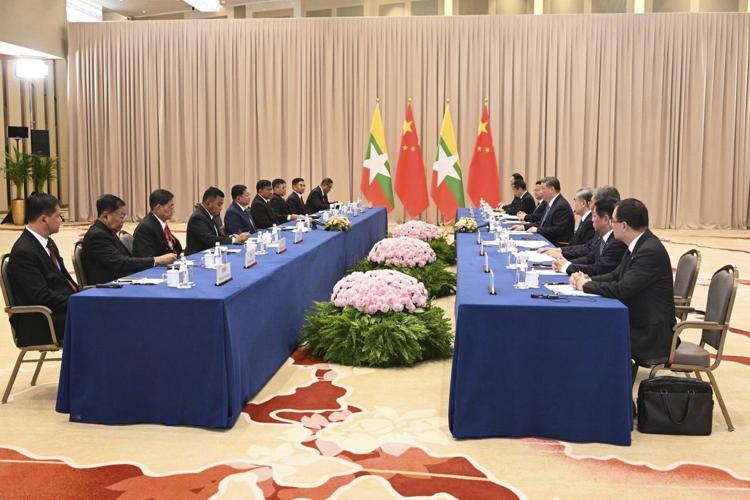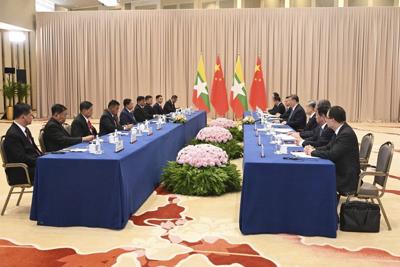BANGKOK (AP) ŌĆö The chief of Myanmar’s military government, Senior Gen. Min Aung Hlaing, has for the first time since seizing power four years ago met with President Xi Jinping of China, a top ally of his military government, state-run media in the Southeast Asian nation reported Saturday.
The Global New Light of Myanmar newspaper reported that Xi pledged to provide assistance for recovery after MyanmarŌĆÖs devastating earthquake in March and aid in efforts to end the countryŌĆÖs civil war. The two leaders met Friday in Moscow on the sidelines of the commemoration of the 80th anniversary of the defeat of Nazi Germany in World War II.
Its report said they also discussed ŌĆ£bilateral relations, enhancing cooperation in all sectors, and cooperating in regional stability and peace.ŌĆØ
Cooperation discussed as Beijing seeks to shore up military government
China has been using its influence with ethnic rebel organizations to ease their pressure on the military government in an apparent effort to stabilize it.
China, along with Russia, is a major arms supplier to MyanmarŌĆÖs military in its war against pro-democracy and ethnic minority resistance forces. Beijing is also MyanmarŌĆÖs biggest trading partner and has invested billions of dollars in mines, oil and gas pipelines, and other infrastructure. Its interests in security in Myanmar are especially strong because the two nations share an 890-mile (1,440-kilometer) border
ChinaŌĆÖs government has maintained good working relations with MyanmarŌĆÖs ruling military, which is shunned and sanctioned by many Western nations for the army’s February 2021 takeover from the elected government of Aung San Suu Kyi and for major human rights violations.
It is also one of the countries providing major relief and reconstruction assistance after the 7.7-magnitude March 28 earthquake that killed more than 3,700 people in Myanmar and injured more than 5,100.
The quake worsened an already dire humanitarian crisis, with more than 3 million people displaced from their homes and nearly 20 million in need due to the war, according to the United Nations.
Beijing has been concerned about instability that threatens its interests in Myanmar since MyanmarŌĆÖs army suffered unprecedented battlefield defeats over the past few years, especially in areas near the Chinese border.
An offensive began in October 2023, by the ŌĆ£ ŌĆØ comprising the Myanmar National Democratic Alliance Army, the Arakan Army and the TaŌĆÖang National Liberation Army, was able to quickly capture towns and overrun military bases and command centers and strategic cities along the Chinese border in northeastern Shan state.
It was widely seen at the time as having BeijingŌĆÖs tacit support to help stamp out rampant organized crime activities in areas controlled by ethnic Chinese.
In early 2024, Beijing helped broker a ceasefire, but that quickly fell apart when the alliance launched new attacks. MyanmarŌĆÖs ruling generals and ChinaŌĆÖs government showed concern as pro-democracy guerrillas and armed ethnic minority groups, sometimes working hand in hand, gained the initiative in fighting.
Beijing put pressure on rebel groups to yield key captured town
The allianceŌĆÖs offensive lost momentum after China shut down border crossings, cut electricity to Myanmar towns and took other measures to discourage the fighting.
Under increasing pressure from Beijing, the Myanmar National Democratic Alliance Army, or MNDAA, withdrew its forces and administration authorities last month from the strategically important town of in northeastern Myanmar, which hosts a major regional military headquarters but which the rebel group seized in August last year.
A member of the MNDAA told The Associated Press on Saturday that the army’s soldiers had already re-entered and and reestablished themselves in bases inside the town at the end of April. He spoke on the condition of anonymity because he is not authorized to release information.
Tar Pan La and Lway Yay Oo, spokespersons for the TaŌĆÖang National Liberation Army, or TNLA, said during an online press conference on May 4 that local residents had been facing difficulties as China and MyanmarŌĆÖs military government blocked trade into areas it controlled.
Tar Pan La said China had continuously urged the group both in person and through messages to avoid clashes along the border and areas of Chinese investments.
The TNLA said in a statement released on its Telegram channel on Saturday that the military carries out daily airstrikes in areas it controls, although it extended until the end of May a ceasefire it declared in the wake of the earthquake.




























